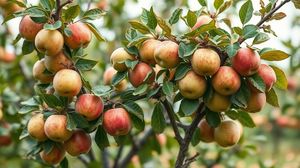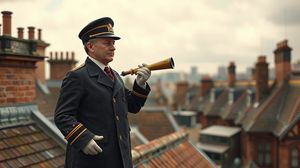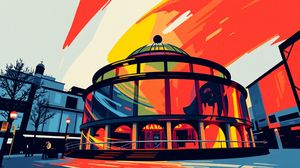
Fenton House in Hampstead is a 17th-century merchant's house that exudes the charm of a bygone era. Managed by the National Trust, it offers visitors a glimpse into a world of elegance and history nestled in the heart of London. The house is renowned for its exquisite interiors and picturesque gardens.
This historic property is known for its impressive collection of art and musical instruments. It houses a range of keyboards, including harpsichords and clavichords, making it a treasure trove for music enthusiasts. The collection offers a unique insight into the musical heritage of the past few centuries.
A standout feature of Fenton House is its delightful walled garden, which combines English country charm with a dash of formality. The garden is home to a diverse array of fruits, including a historic orchard, and ornamental borders, providing an idyllic retreat from the city's hustle and bustle.
An interesting point about Fenton House is its role in preserving rare Chinese porcelain and 17th-century needlework. The eclectic assemblage reflects the tastes and wealth of former residents, giving a glimpse into the luxurious lifestyle of London's merchant class during that period.
The house also boasts one of the highest viewpoints in Hampstead, offering panoramic views over London from its rooftop terrace. This vantage point provides a striking contrast to the urban landscape, showcasing the city's iconic skyline alongside the immediate verdant surroundings.
What makes Fenton House even more intriguing is its survival through the Great Fire of London and the Blitz of World War II. Its continued existence and preservation are a testament to its historical and architectural significance, maintaining its status as a treasured landmark through the ages.

Making the Most of Your Visit:
Take your time exploring the musical instruments in Fenton House. This unique collection is not just for display; during your visit, listen out for impromptu performances by talented volunteers or staff who occasionally play the harpsichords and other instruments.
The topmost floors of Fenton House offer some of the finest views of London. Make sure to head up to the rooftop terrace to enjoy the panorama, especially on a clear day. If you're into photography, it's a perfect spot to capture both the natural beauty of Hampstead and the distant city skyline.
Don't miss the delightful walled garden. Explore the different sections, especially the historic orchard where you can find rare and old varieties of apples. It's a serene spot for anyone wanting to soak in the tranquility of the surroundings with a touch of pastoral charm.
Keep an eye out for the exquisite needlework and porcelain collections inside the house. These pieces are often overlooked, but they offer a fascinating insight into the decorative arts of the period and reflect the global trade links of 17th-century merchants.
If possible, visit during the annual Apple Day in October. This event usually offers an array of garden activities, tastings, and a chance to buy delicious homemade treats. It's a lovely way to connect with the local community and experience Fenton House's orchard at its best.

Visiting Times & Costs:
Fenton House in Hampstead is open to visitors, offering a chance to explore this historical gem. The property is managed by the National Trust and typically opens to the public between March and October. Opening days are usually Wednesday to Sunday, but it's advisable to check for any seasonal variations or special closures.
Visitors should be aware that an entrance fee is required to explore Fenton House and its gardens. National Trust members can access the house for free, while non-members are required to pay an admission fee. Pricing details are typically updated annually, so it's best to verify the latest ticket prices before planning a visit.
Regarding accessibility, Fenton House presents some challenges due to its historic nature. The upper floors and rooftop terrace may not be fully accessible to visitors with mobility issues, as there are no lifts, and access is via staircases. However, the gardens offer relatively better accessibility, allowing visitors with mobility difficulties to enjoy the outdoor spaces.

Address & Map:

Nearby:























